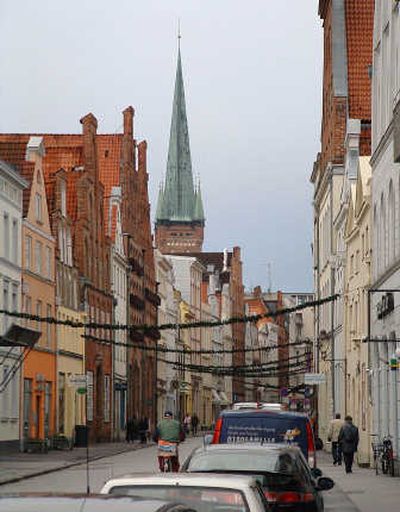Luebeck not quite as chummy

Luebeck and Spokane are just friends. The two cities were once sisters, but blood relations apparently don’t bind places as permanently as they do people.
I learned this last January when a fellow Spokane resident persuaded me to visit the German town after a New Year’s trip to Berlin. Usually a reliable source of Northwest trivia, he’d assured me it was a sister city of our hometown.
So I traveled three hours north by train, toting a heavy pack and holiday hangover, hoping for a glimpse of home after gallivanting through Europe for far too long. When I stepped from the station, however, all I saw was darkness.
Wandering toward the city center I looked for signs of life but saw only signs announcing “Geschlossen,” German for “closed” – a word that became very familiar.
I passed under the grand Holsten Gate, its magnificence briefly soothing my fatigue. But there aren’t many things less magnificent than wandering the streets of a foreign city while cold, tired and hungry, and I cringed as rain added company to misery.
Crossing a bridge, I headed for a bright light in the distance that turned out to be an illuminated tourist map. It was annotated with the slogan, “Luebeck, the City of Short Distances” – which, while clever and possibly true, didn’t help a guy with no known destination.
The city of Luebeck is surrounded by the Trave River and its canals, and can be circumnavigated in about 45 minutes. I experienced this firsthand before finally, fortuitously, sighting the Rucksack Hotel, a brilliant little hostel run by the most gracious host that I’ve ever embraced in a stranglehold of overstated thanks.
I was set up with a bed and then pointed down the road toward some tikka masala worthy of a Bollywood product placement. The restaurant (aptly named “Bollywood”) even offered yoga lessons – not directly after dinner, I imagine, as Indian food and movement don’t go together so well.
The following morning, after a meal and a night’s rest, life seemed more viable. The streets, scented by the town’s abundant bakeries, served to warm the winter dawn a little. It was only 5 o’clock, but I had a flight out of the country that afternoon and wanted to see everything possible beforehand.
I was excited. This was the day I’d meet the dear Deutsch sister of my fair hometown – a mistake not recognized until just before my departure. The upside to this error was that I assumed I was acquainting myself with a relative all morning, and thus saw everything and everyone as exceptionally welcoming.
I found myself grinning at bicyclists as they sped by on their way to work and waving hello to an old woman and her dog. The bicyclists swerved while dinging their bells, the dog snarled and the woman muttered a German phrase I told myself was “Godspeed young man!” but was probably more along the lines of, “Stay away.”
Despite the crankiness of the crack-of-dawn set, it was still a beautiful morning. As church bells rang I rounded the west side of the island and stood listening at the edge of the harbor where historical sailing ships drifted beside a century-old swing bridge.
It took five minutes for the resonant music to fade as the sun climbed snowy rooftops. I say “music,” but I couldn’t help wonder what adjectives bed-bound citizens were employing just then. Better left untranslated, I’m sure.
I spent all morning dashing down cobbled streets, snapping blurry pictures of quaint bungalows and grand churches. As I jogged, I scanned pages of a tourist map I’d pilfered from the hostel, looking up occasionally to actually set eyes on some of the things I was reading about.
The short stopover wasn’t nearly sufficient to satiate my curiosity about the city, so before leaving I visited the tourist information center to find out more. I asked the woman at the desk about Luebeck’s sister city status, but she stared at me like we weren’t even speaking the same language.
Then I recalled where I was and opted for slower, louder English, as we Americans often do when traveling abroad. She called her colleague over, ostensibly to join in staring at this boisterous Yank who was asking if his sister lived in town.
A few more tongue-tied tries made it clear what I was after and she regretfully said, “Sorry, we have no sister in Washington.”
I left for the airport feeling dejected and foolish. Once home, however, I found I couldn’t admit defeat so easily, and searched for evidence of sisterhood.
What I found was a story in the May 5, 2000, issue of The Spokesman-Review headlined, “Spokane Kisses Sister Goodbye.”
The article said a lack of interest by Luebeck led to the dissolution of the Spokane-Luebeck Sister City Society after downgrading relations to a Friendship City status. Apparently Mayor Talbott even sent a letter to the Burgermeister of Luebeck telling him the bad news, but there was no reply.
While I couldn’t help feeling a bit hurt over Luebeck’s disregard for Spokane, I had to forgive the city immediately. After all, who could hold a grudge against a friend who furnishes a warm bed, a few good meals, and a tour of the neighborhood when you show up on their doorstep late at night?
Whatever our relationship may be, that’s family treatment.